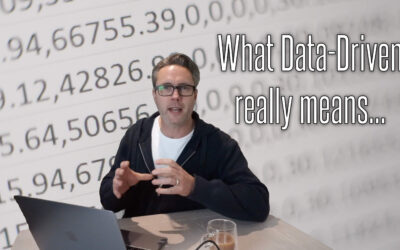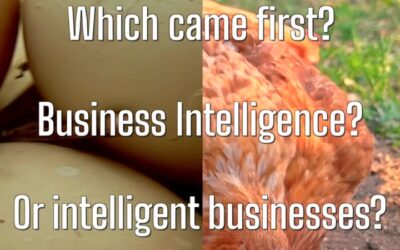Single Version of Truth?
A ‘single version of truth’ is a scenario where conflicting data from multiple disparate sources, is consolidated into one single source that conforms to agreed data standards. It’s a long-standing business intelligence goal which makes sense to all businesses, yet it remains elusive to many. Over the years, the experiences of businesses that have attempted to achieve a single version of truth have shown that the objective can often feel unrealistic and too difficult to achieve. Sometimes, a single version of truth is perceived to be a superficial aim, the benefits of which should be taken with a pinch of salt.
But the core principle remains entirely valid. A business can make faster and more accurate decisions if everyone is working with the same, accurate information based on the same well-governed sources of data. This principle grows ever more important as the volume, complexity and diversity of data available to businesses continues to increase.
So with this article, I would like to reinvigorate the topic of attaining a single version of truth, by presenting some old but valid wisdom in a new way. I want to share an approach to achieving a single version of truth that could help your business to significantly elevate the value of its information, and the benefit it has on your business’s processes.
It’s generally accepted that the battle to achieve a single version of the truth is not won or lost in a data warehouse. Any organisation will find it is relatively straightforward to successfully build a reporting data architecture around a single version of truth. It is another matter entirely to get all of the right people committed to using it and all of the right business processes aligned to it. Achieving a single version of data truth is not enough. You must go one step further and use that to create a single version of information truth. This can be a major challenge, as in the collective minds of your business’s BI consumers, there is often no one single version of truth. Different people can have apparently equally valid justifications for using opposing sources of information.
How to achieve worthwhile business benefits?
So to achieve the very worthwhile business benefits, you must turn the challenge on its head. Before creating a single version of data truth, how will you make sure everyone will willingly use it? To do that, you must venture beyond your data warehouse and focus on creating an environment where only one single version of information truth can survive and prosper. The key to doing this, is strong and effective information governance.
Information governance is not the same as data governance. Data governance delivers the data quality controls to help you to achieve a single version of the truth on your data. It won’t help your business to use that and benefit from it. Without information governance, your hard-fought single version of data truth will be continually deposed and ignored by people who, for whatever reason, wish to pursue different sources of information.
Like data governance, information governance consists of policies, procedures and roles inside a framework. However the focus is not on the quality of data, rather it is on the quality of the information produced with the data. And also crucially, the quality of the way in which the information is applied to business processes. There are three particular aspects of information governance that when applied together, can completely transform your efforts to achieve the benefits of a single version of information truth.
Aspects of information governance
The first is information standards. It goes without saying of course, that before you can govern the information in your organisation, you need a set of agreed information standards to aim for. Your organisation’s information standards must exist at the core of your information governance efforts.
The second is to create a centralised BI support service, which I like to call a BI Bureau. This service is for anyone that creates reports or analyses. It provides them with an easy and convenient means of ensuring that their report or analysis complies with your organisation’s information standards. It’s really simple – the person creating the report just sends it to the BI Bureau. A BI expert assesses both the data query and the report content to ensure that it’s based on the right data. The information is being presented in the right way using standardised business terminology.
The third is to build a brand for BI excellence in your business. This is what will make people care enough about information quality to use the BI Bureau service. It’s the secret sauce in your recipe for creating a true single version of truth. When your organisation has well-defined information standards, and you have provided the business with a BI Bureau service that helps people to easily achieve those standards, all you have to do is make it very plain to see when information has successfully cleared the information approval process, and when it has not. Reports and analyses passing through the BI Bureau receive a visible seal of approval. For instance in the form of a familiar footnote that states the name and contact details for the BI Bureau member who verified that the report meets information standards.
The effect of this is that people begin to look for and recognise when a report or piece of data analysis has been approved by the BI Bureau. They associate that recognition with a feeling of trust and confidence in the accuracy of the information. After a time, reports that have not passed through the BI Bureau find it difficult to gain traction with people and in processes. Sooner or later, a situation emerges where anyone who wishes to ensure that their report or analysis is used and taken seriously, must send it through the BI Bureau.
Crucially, this approach does not hinder the essential ability of business people to self-serve BI solutions. Or the ability of people in data analysis roles to discover and explore new stories that your data may be able to tell. The role of the BI Bureau must always be to simply validate that information is aligned to a presiding single version of truth. The BI Bureau must exist as a part of an information governance framework that includes an information governance committee. This considers proposals to evolve information standards in response to new methods of generating valuable information from data, and ever-changing business needs.
In summary; if you’re striving to achieve a single version of truth, avoid the mistake of focusing all efforts solely on data. Remember that accurate data alone doesn’t automatically translate into business value. The data governance necessary to achieve a single version of data truth, must be reflected in information governance. This ensures that only the right sources of data are used to create the information that informs the business’s actions and decisions.
If you would like some help on setting information standards and building a successful information governance framework, contact Truly Intelligent Business by visiting https://trulyintelligent.business/
For an initial discussion which is of course entirely free of cost and obligation. Why not book some time with me by clicking on this link https://calendly.com/philhusbands I look forward to speaking to you!





Hey,
Thanks for sharing this blog, I know that businesses depend on good data.
Keep it up. Phil